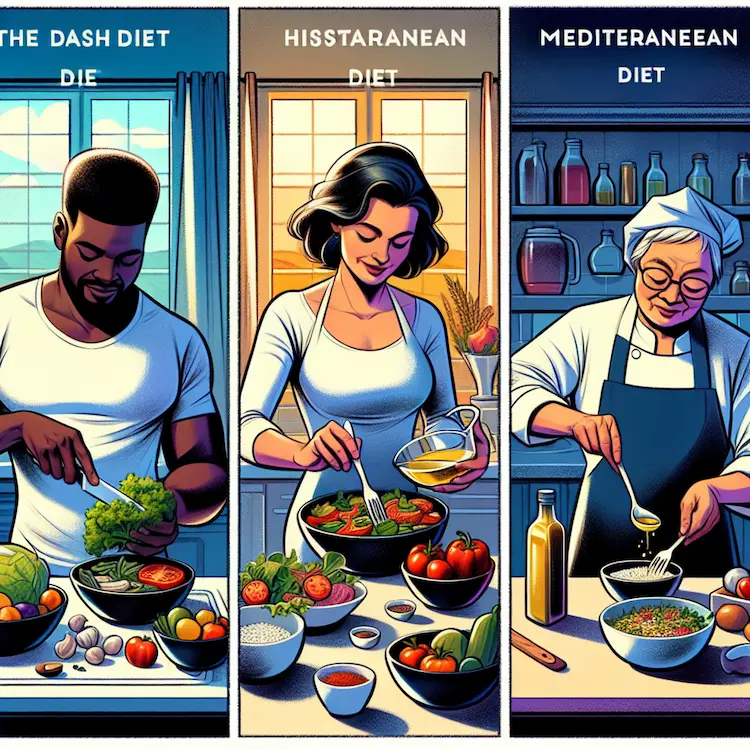Blood pressure is a critical health indicator that can be significantly influenced by our dietary choices. Understanding the relationship between diet and blood pressure is essential for maintaining cardiovascular health and preventing hypertension-related complications. This comprehensive article explores the various ways in which our eating habits impact blood pressure and provides practical advice for managing this vital health metric through dietary interventions.
Blood pressure is the force exerted by blood against the walls of arteries as the heart pumps. It is typically measured in millimeters of mercury (mmHg) and expressed as two numbers: systolic pressure (when the heart beats) over diastolic pressure (when the heart rests between beats). Maintaining healthy blood pressure levels is crucial for several reasons:
Research has shown that certain dietary patterns can have a significant impact on blood pressure levels. Let’s explore some of the most well-studied approaches:

The Dietary Approaches to Stop Hypertension (DASH) eating plan is one of the most effective dietary interventions for managing blood pressure. Key components of the DASH diet include:
Studies have shown that the DASH diet can lower systolic blood pressure by 8-14 mmHg, which is a clinically significant reduction.
The Mediterranean diet, characterized by its high intake of plant-based foods, olive oil as the primary fat source, and moderate consumption of fish and poultry, has also been associated with blood pressure benefits. This dietary pattern is rich in:
While not specifically designed for blood pressure control, the Mediterranean diet has shown cardiovascular benefits, including improvements in blood pressure levels.
Reducing sodium intake is a well-established strategy for lowering blood pressure. The American Heart Association recommends limiting sodium intake to no more than 2,300 mg per day, with an ideal limit of 1,500 mg for most adults. Studies have shown that reducing sodium intake can lead to significant reductions in blood pressure, particularly in individuals with hypertension.
Several specific nutrients and food groups play crucial roles in blood pressure regulation:
Potassium helps counteract the effects of sodium on blood pressure. Foods rich in potassium include:
Aim for 3,500 to 5,000 mg of potassium daily, which may lower blood pressure by 4 to 5 mmHg.
These minerals contribute to blood pressure regulation by promoting smooth muscle relaxation in blood vessels. Good sources include:
A diet high in fiber, particularly from fruits, vegetables, and whole grains, has been associated with lower blood pressure levels. Aim for at least 25-30 grams of fiber per day.
Found primarily in fatty fish, omega-3s have anti-inflammatory properties that may contribute to blood pressure reduction. Include fish like salmon, mackerel, or sardines in your diet twice a week.
To better understand the effectiveness of different dietary approaches on blood pressure, let’s compare their key features and potential impacts:
| Dietary Approach | Key Features | Potential BP Reduction | Other Benefits |
|---|---|---|---|
| DASH Diet | High in fruits, vegetables, low-fat dairy; low in saturated fat | 8-14 mmHg systolic | Lowers LDL cholesterol |
| Mediterranean Diet | Plant-based, olive oil, moderate fish/poultry | 4-10 mmHg systolic | Reduces cardiovascular risk |
| Low-Sodium Diet | Limits sodium to 1,500-2,300 mg/day | 5-6 mmHg systolic | Beneficial for overall heart health |
| High-Potassium Diet | 3,500-5,000 mg potassium daily | 4-5 mmHg | Counteracts sodium effects |

Maintaining a healthy weight is crucial for blood pressure control. Even modest weight loss can lead to significant improvements in blood pressure. For every kilogram of weight lost, systolic blood pressure may decrease by about 1 mmHg.
While diet plays a crucial role in blood pressure management, it’s important to consider other lifestyle factors:
Diet plays a pivotal role in blood pressure management, offering a powerful, non-pharmacological approach to maintaining cardiovascular health. By adopting a dietary pattern rich in fruits, vegetables, whole grains, and lean proteins, while limiting sodium and unhealthy fats, individuals can significantly impact their blood pressure levels.
The DASH and Mediterranean diets stand out as particularly effective approaches, providing comprehensive nutritional benefits beyond blood pressure control. However, the key to success lies in finding a sustainable eating plan that aligns with individual preferences and lifestyle.
Remember that dietary changes should be part of a holistic approach to health, including regular physical activity, stress management, and appropriate medical care. Always consult with a healthcare provider before making significant changes to your diet, especially if you have existing health conditions or are taking medications.
By making informed dietary choices and embracing a heart-healthy lifestyle, you can take control of your blood pressure and contribute to your overall well-being. Start with small, manageable changes and gradually work towards a more comprehensive approach to reap the long-term benefits of a blood pressure-friendly diet.